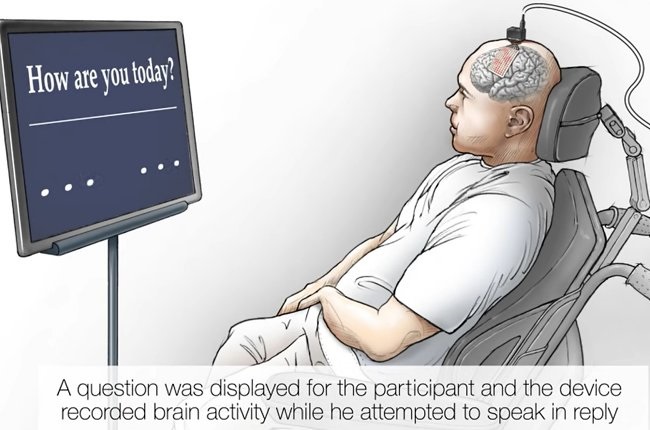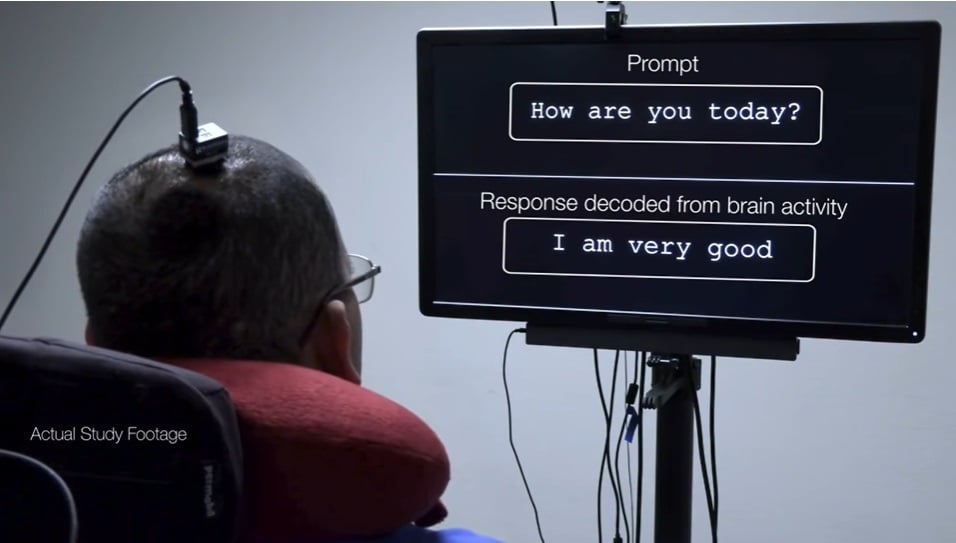- A research team in the US has shown that full words and sentences can be decoded from the brain activity of a person with paralysis who is unable to speak.
- The team worked with a brainstem stroke survivor who lost his ability to articulate words more than a decade ago.
- They say that this new advance paves the way for new technology to help restore natural communication for people with severe paralysis.
A paralysed patient can now 'write' his thoughts using a brain implant that reads his brain signals and translates them into written words - a huge leap in the field of neuroscience.
This breakthrough is hugely promising for people who suffer from anarthria - an inability to articulate speech - which usually happens as a result of a brain injury or neurological disorder, such as a stroke. Healthline explains that people who experience anarthria can understand words but cannot produce intelligible speech.
The 36-year-old man, who, at 20, suffered a severe stroke and lost his ability to speak, is part of a trial involving researchers from the Chang Lab at University of California, San Francisco (UCSF).
The device they created reads the electrical impulses that comprise his thoughts and then transmits the text to a device that displays or sounds it out.
READ MORE | I was fit, ate healthy, and had no risk factors – yet I had a stroke at 33. Here’s what I wish I had known
The team behind this study conducted a major experiment a few years ago wherein the current patient participated. Unfortunately, the brain-computer interface (BCI) prototype they created then mistranslated the thoughts of around a quarter of the trial's participants.
This time, however, the study, led by top neuroscientist Edward Chang, involved a more sophisticated BCI that translates the person's brain's electrical signals into individual letters instead of whole words or phrases. In other words, the man could spell out his thoughts, one letter at a time, in real-time.
Writing about their findings, the team says:
"We expect that the approaches described here ... would be appropriate for both speech-related neuroscientific investigations and BCI development with patients regardless of the severity of their vocal-tract paralysis, assuming that their speech-motor cortices are still intact and that they are mentally capable of attempting to speak."
READ MORE | Life after a stroke: The brain is self-healing, all you need to do is take care of it, says survivor
Process of communicating
To simplify things, the team taught the participant the NATO phonetic alphabet. For example, "Alpha" for A, "Bravo" for B and "Charlie" for C. Then, they asked the participant to spell out their thoughts by thinking of each letter's NATO code word. A question was then displayed for him, and the device recorded his brain activity while he attempted to speak in reply. Following this, a computer algorithm translated his brain activity patterns into words and sentences in real-time.
According to their report, which appears in the journal Nature Communications, the man could produce sentences from a vocabulary of more than 1 150 words at a speed of 29.4 characters per minute (about seven words per minute). This was a considerable improvement from past tests, which had only a median success rate of around 75%, as reported in the New England Journal of Medicine. Although the device occasionally made mistakes, this error rate was low at 6.13%.
Currently, the only way for the participant to be connected to the decoder is to be physically plugged into the device via a port that sticks up through the skin of his scalp. However, study co-author Sean Metzger, a doctoral candidate in Bioengineering, told Live Science that, ideally, in the future, the system will be completely wireless.
Samuel Andrew Hires, a University of Southern California neurobiologist, told The Daily Beast he was impressed by the results. "A typical human is around 30 to 35 words per minute with modern text prediction, perhaps faster if you are a teenager," said Hires, who was not involved with the study.
READ MORE | Strokes are on the rise among younger people: A neurologist offers important tips to be aware of
He added: "Here, the subjects were only about six times slower, which is quite impressive considering they couldn't move or speak. I'm not sure what my word error rate is on my phone, but it feels like about one in every 10 words, on par with the performance from brain decoding."
Co-author of the study and UCSF neuroscientist David Moses also told the publication that further experimentation is necessary to be confident the system is widely effective.
"We think that the main thing to confirm is that our BCI can work with a variety of users with a variety of disabilities," Moses said. For 15 years, the current study participant relied on other, limited means of communication. "The advance paves the way for new technology to restore natural and rapid communication for people with severe paralysis," notes a video release on the research.




 Publications
Publications
 Partners
Partners













